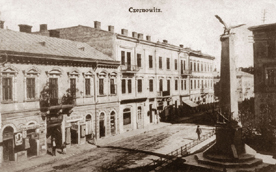|
HOME
|
||
|
|
|
|
|
|
||
|
• In Bucharest, Al. I. Odobescu edits Revista Română (The Romanian Magazine), a monthly publication with encyclopaedic orientation, in which there will be printed Istoria românilor supt Mihai-Vodă Viteazul (The History of the Romanians under Michael the Brave), by Nicolae Bălcescu, and the novel Ciocoii vechi si noi (The Old and the New Toad Eaters), by Nicolae Filimon. The publication will appear for two years. • Foundation, in Sibiu, of Astra – Asociatia Transilvană pentru Literatura Română si Cultura Poporului Român (The Transylvanian Association for Romanian Literature and Culture of the Romanian People) – which will bring a decisive contribution to stimulating the cultural life of Romanians in Transylvania; Andrei Saguna was its first President, Timotei Cipariu – vice-President, George Baritiu – Secretary. • 1862-1865. Issuing, in Vienna, of Aron Pumnul's ample work, entitled Lepturariu rumânesc cules den scriptori rumâni (A Romanian anthology of Romanian writers), in 4 tomes, the first collection of old and modern Romanian literature. • 1862, January 24. In Bucharest opens the first Parliament of Romania. Prince Al. I. Cuza proclaims in solemn session the final Union of the Principalities, the capital being settled in Bucharest. • 1863. In the spring of this year, Mihai interrupts his gymnasium studies, remaining at Ipotesti. His attempts of obtaining a scholarship grant for resuming his studies in the country fail. • Grigore Alexandrescu - Meditatii, elegii, epistole, satire si fabule (Meditations, ellegies, epistles, satires and fables), Bucharest • December 28. Afflicted by typhus, Ilie – the poet's brother – dies in Bucharest. • Death of the poet Andrei Muresan (b. 1816). • 1864. Constitution, in Jassy, of the literary, cultural and political circle Junimea, with Titu Maiorescu, Th. Rosetti, P.P. Carp, Vasile Pogor and Iacob Negruzzi among its founding members. The leading principles of Junimea and of its members (the so-called Junimists): art's delimitation from any political and social aspects, pre-eminence of the æsthetic criterion in judging works of art, cultivation of the literary language by resorting to the thesaurus of orality and to colloquial speech, are insistently promoted in the cultural life of the time by means of conferences („popular lectures”), studies, journals and magazines. • February. The theatrical company of Fanny Tardini begins in Chernovitz a tour with 20 performances, represented in Romanian. • May. Again in Chernovitz for resuming his studies as a private pupil, Mihai attends the theatrical performances of Tardini's company and leaves for Brasov together with the actors, abandoning school once again. • October 1864 - March 1865. Mihai is in Botosani, working as a probationer in the Tribunal of Botosani and also as a transcriber at the Permanent Committee of the Botosani county. Soon, he gives up his latter job and leaves for Chernovitz, to resume his abandoned studies but, once again, he will not remain long in school, setting out in a new tour with the same theatrical company. [next] |
||
|
|
||
|
Memorialul Ipoteşti
−
Mihai Eminescu National Center for Studies
2011-2022 © Memorialul Ipoteşti |
||



